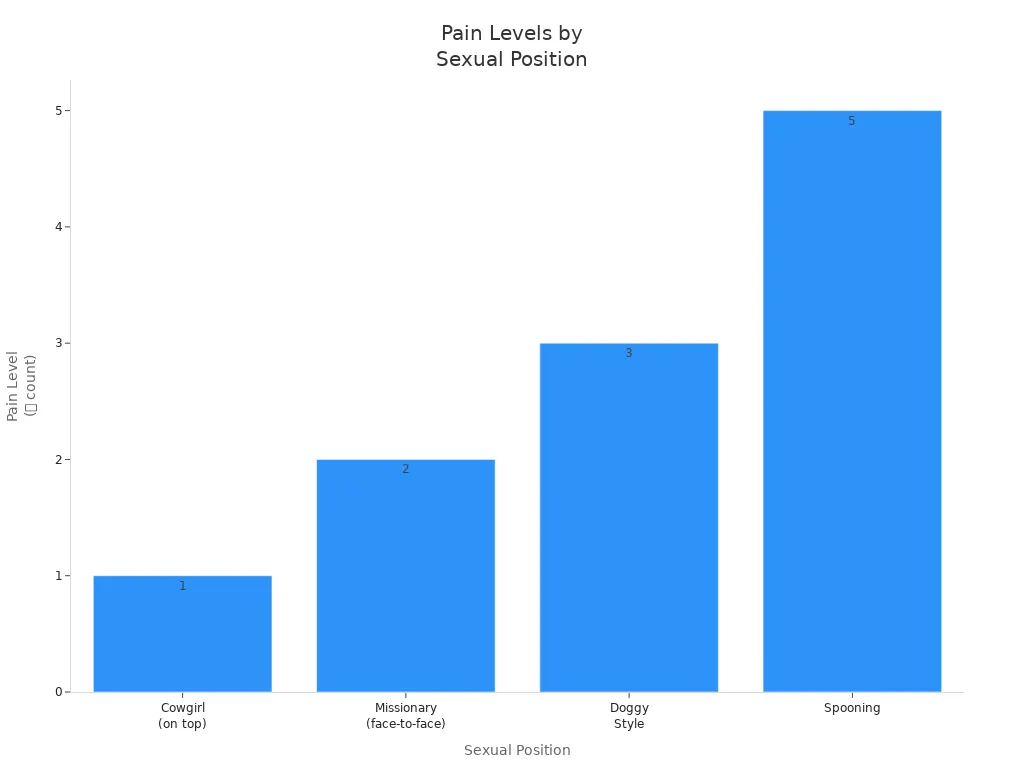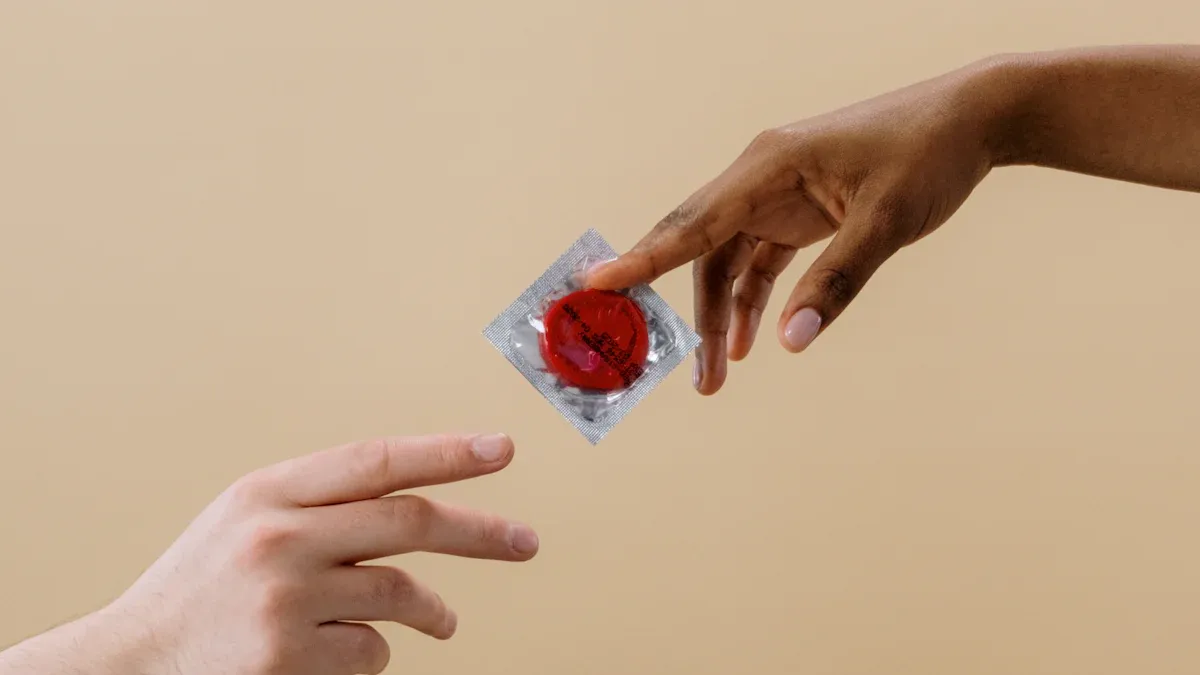First Time Sex Without Fear Practical Tips for a Positive Experience

You may feel worried about first time sex, but it does not have to hurt or be scary. Many people feel the same way, and you can handle it with some simple steps. Talking honestly with your partner often makes you both feel more comfortable, trusting, and happy. Studies show that open talks help you feel closer and safer together. Be kind to yourself and get to know your own body.
Remember, sexual health education gives you the facts to make choices that feel right for you.
Key Takeaways
It is normal to feel nervous before your first time. Take things slowly and talk with your partner. This helps you both feel safe and comfortable.
You do not have to accept pain during sex. Use lots of foreplay and lubrication. Try gentle and easy positions to help stop pain.
Learning about your own body by exploring it can help you feel sure of yourself. It also helps you say what you need.
Talking clearly about what you want and how you feel makes things safer. It also helps both people enjoy the experience more.
If you still feel pain or fear, ask a healthcare worker or therapist for help. There is support for you and it can really help.
Understanding First Time Sex
Common Fears
You might feel excited and worried before your first time. Many people feel nervous about their first time. This is normal and happens to lots of people. Some common worries are:
Feeling nervous and unsure about what will happen
Worrying about how your body will react or if you will finish too soon
Being scared of pain or feeling uncomfortable, especially for girls
Wondering if you are ready or if your feelings are right
Feeling pressure from friends, family, or culture to act a certain way
Being anxious about talking, saying what you want, or giving consent
Worrying that it will not be as good as you hope
You might hear stories about the hymen or bleeding, but these are not true for everyone. The hymen can change from sports or other things, not just sex. Not all girls bleed the first time. Virginity is an idea people talk about, but it is not a medical thing. There is no test for it, and everyone’s first time is different. If you are scared of pain or sex, talking openly and going slowly can help you feel safe.
Tip: You do not need to hurry. Take your time and talk with your partner about what feels best for you.
Emotional and Physical Factors
Your feelings and your body both matter for your first time. Stress or worry can make you feel more tense or scared. This can make things hurt more or make you more afraid. Your mental health is just as important as your body.
Here is a table that shows how different things can change your experience:
Factor Type |
Description |
|---|---|
Physical Factors |
Your body changes during puberty. This can make you feel more ready or interested. |
Emotional Factors |
Being mature helps you deal with feelings and choices about sex. |
Social Factors |
Friends, family, and media can change how you think about your first time. |
Gender Differences |
Boys and girls often feel different pressures and expectations. |
Education |
Learning about sex and protection helps you make safer choices and feel less scared. |
Cultural Norms |
Some cultures want you to wait until marriage. This can make you feel more pressure or worry. |
If you feel stressed or worried, you are not alone. Many people are scared of sex or pain. Talking to someone you trust or a professional can help you feel better and more ready.
Pain During Sex
It is normal to worry about pain during sex, especially the first time. Many people feel this way, but you do not have to just accept pain. There are things you can do to make sex feel better and more comfortable.
Causes of Painful Intercourse
Pain during sex happens more often than you might think. There are many reasons why sex can hurt, especially the first time. Here are some common reasons for painful sex:
Vaginal dryness can happen if your body does not make enough natural lubrication. This can be caused by hormones, stress, or not enough foreplay.
Infections, like sexually transmitted infections or yeast infections, can make things sore and painful.
Pelvic floor muscle tension means the muscles around your vagina get tight. This can make penetration hurt.
Some medical conditions, like endometriosis or skin problems, can cause pain.
Bladder or bowel problems, like urinary tract infections or inflammatory bowel disease, can also make sex hurt.
Sometimes pain is felt at the entrance, and sometimes it is deeper inside.
If you feel burning, itching, or see unusual discharge, you might have an infection. You should see a doctor if these signs do not go away.
Vaginismus and Other Conditions
Some people have pain because of vaginismus. This means the muscles around your vagina squeeze tight without you trying. This muscle tension can make penetration very hard or even impossible. You are not alone if this happens to you. Studies show about 2% of young women have genito-pelvic pain/penetration disorder, which includes vaginismus, and about 12.5% have some symptoms. Younger women, especially those having sex for the first time, notice these problems more.
Here is a table that shows how common these problems are:
Group |
Percentage with Symptoms |
|---|---|
Young women (first-time sex age) |
Up to 12.5% |
Women under 25 (clinic data) |
18% |
Women at birth control clinics |
16% |
You do not have to live with pain during sex. If you keep feeling pain or discomfort, talk to a healthcare professional. They can help you find out what is wrong and suggest ways to make sex feel better.
Overcoming Sexual Pain
You might feel worried about overcoming sexual pain, but you do not have to accept pain as normal. Many people believe pain is just part of first time sex, but that is not true. You deserve pain-free sex, and there are many ways to make your first experience more comfortable and enjoyable. Overcoming pain during sex starts with understanding your body, talking openly, and using practical tips that really work.
Lubrication and Foreplay
Lubrication makes a huge difference when you want pain-free sex. Your body might not always make enough natural lubrication, especially if you feel nervous or rushed. Using a water-based or silicone-based lubricant can help reduce friction and make things smoother. Clinical studies show that more than half of people who use lubricant notice less pain and more comfort during sex. Both you and your partner can enjoy a smoother experience, and you will likely feel more relaxed.
Foreplay is just as important. The importance of foreplay cannot be ignored. When you spend time on kissing, touching, or anything that makes you feel good, your body gets ready for sex. Extended foreplay helps your body make more natural lubrication and relaxes your pelvic floor muscles. This means less tension and less pain. Couples who spend 15 to 25 minutes on foreplay often feel more satisfied and have a better chance of reaching orgasm. You also build trust and emotional connection, which helps you feel safe and cared for.
Tip: Do not rush. Take your time with foreplay and use plenty of lubricant. Your comfort comes first.
Gradual Progression
Going slowly is one of the best ways to start overcoming sexual pain. You do not need to do everything at once. Start with gentle touching and only move forward when you feel ready. Listen to your body and stop if you feel pain. Open communication with your partner helps you both know what feels good and what does not. You can try different things and see what works best for you.
If you have had healing from painful sex in the past, you might feel scared to try again. That is okay. Take small steps and celebrate every bit of progress. You can also try self-help techniques, like gentle pelvic floor exercises or relaxation methods. Some people find pelvic floor physiotherapy very helpful. In one study, women who tried this therapy went from avoiding sex to enjoying it with almost no pain. Overcoming sexual pain is possible, and you do not have to do it alone.
Comfortable Positions
Choosing the right position can make a big difference in overcoming sexual pain. Some positions put less pressure on sensitive areas and let you control the depth and speed. Experts often recommend the cowgirl position (you on top, partner lying on their back) as the least painful. You can move at your own pace and stop if you feel any pain. The missionary position (partner on top, face-to-face) is also a good choice, especially if you use pillows to support your back.
Here is a chart that shows how different positions compare for pain and comfort:

Sexual Position |
Pain Level (🔥 = pain) |
Expert Tips |
|---|---|---|
Cowgirl |
🔥 (least painful) |
You control movement; use pillows for comfort. |
Missionary |
🔥🔥 |
Adjust angles; support your spine with pillows. |
Doggy Style |
🔥🔥🔥 |
Can strain your back; use pillows to adjust height. |
Spooning |
🔥🔥🔥🔥🔥 (most painful) |
Not recommended for first time; can cause hip pain. |
Always put comfort first. Use pillows, change angles, and talk to your partner about what feels best. If you keep feeling pain, do not ignore it. Healing from painful sex takes time, and you might need help from a doctor or therapist. Overcoming sexual pain is about finding what works for you and making sure you feel safe and happy.
Remember: Overcoming sexual pain is not just about your body. It is about trust, care, and listening to yourself. You deserve comfort and pleasure every time.
Overcoming the Fear of Sex

Feeling nervous about your first time is very common. You might notice your heart racing or your mind filling with worries. The fear of sex can make you feel tense, but you can learn ways to feel calm and confident. Let’s look at some simple steps for overcoming the fear of sex.
Relaxation Techniques
You can use relaxation techniques to help your body and mind feel safe. Many people find that deep breathing helps slow down racing thoughts. Try breathing in slowly through your nose, holding for a few seconds, then breathing out through your mouth. Mindfulness meditation also works well. It helps you focus on the present moment instead of worrying about what might happen. Some people use Cognitive Behavioural Therapy (CBT) to challenge negative thoughts about sex. CBT teaches you to notice and change unhelpful thinking patterns. You might also find that talking openly with your partner helps you feel less pressure. A healthy lifestyle, with regular exercise and good sleep, can make you feel stronger and less anxious.
Tip: If you feel very anxious, you can talk to a therapist. They can help you find the best way to relax before sex.
Self-Exploration
Getting to know your own body is a big step in reducing the fear of sex. You can explore what feels good by yourself, without any pressure. This helps you learn what you like and what makes you feel safe. You might try gentle touch or use a mirror to look at your body. When you understand your own comfort, you can share this with your partner. This makes it easier to say what you want and what you do not want. Self-exploration can also help you feel more in control, which lowers anxiety.
Building Confidence
Building confidence takes time, but you can do it. Sex therapists suggest different ways to help you feel sure of yourself. Here is a table with some helpful methods:
Method |
Purpose and Benefits |
|---|---|
Sensate Focus Exercises |
Build trust through gentle touch and reduce performance worries. |
Communication Skills Training |
Help you talk about your needs and listen to your partner. |
Mindfulness and Sensory Awareness |
Keep you focused on the moment and less worried about mistakes. |
Cognitive Behavioural Therapy |
Change negative thoughts and boost your self-belief. |
Emotional Processing |
Work through past worries that might affect your confidence. |
You can start small. Try talking about your feelings with your partner or set simple goals for each step. Remember, nobody expects you to be perfect. Confidence grows as you learn and try new things. If you still feel a strong fear of sex, a sex therapist can guide you with special exercises and support.
Remember: Overcoming the fear of sex is a journey. You deserve to feel safe, happy, and confident every step of the way.
Communication and Trust

Discussing Boundaries
Talking about boundaries helps you feel safe and respected. You might feel nervous at first, but sharing your limits and asking for consent before anything happens makes a big difference. When you and your partner talk about what you want, what you do not want, and how you feel, you both build trust. This kind of open conversation helps you feel empowered and comfortable. It also means you can talk about things like contraception, how often you want to have sex, and what feels right for you. When you discuss boundaries, you create a space where both of you feel valued. This leads to better emotional comfort and a more satisfying experience.
Tip: You can check in with your partner during sex by asking, “Is this okay?” or “How are you feeling?” This shows you care about their comfort.
Expressing Needs
You deserve to have your needs heard. When you share what you like or do not like, you help your partner understand you better. Here are some ways expressing your needs can improve your first time:
1. You build respect and emotional safety. 2. You can talk about your desires and worries without feeling judged. 3. Setting aside time to talk and using “I” statements helps you feel heard. 4. You make sure both of you give and get consent. 5. Respecting each other’s wishes makes the experience more enjoyable. 6. You can talk about fantasies or dislikes without shame. 7. Experts say creating a safe space for these talks makes first-time sex more comfortable.
Note: You can say, “I like it when you…” or “I feel nervous about…” to start the conversation.
Creating a Safe Space
A safe space means you both feel relaxed and free to be yourselves. You can use these strategies to help:
Strategy |
Description |
Actionable Tip |
|---|---|---|
Talk openly about your feelings and fears. |
Have regular check-ins to share thoughts. |
|
Build Self-Awareness |
Notice your own feelings and share them. |
Reflect daily and talk honestly. |
Address Conflicts |
Solve problems before they grow. |
Listen and compromise after cooling off. |
Emotional Bonding |
Spend time together outside of sex. |
Go for walks or have deep talks. |
Reduce Stress |
Keep your space calm and peaceful. |
Make a cosy spot at home to relax. |
Non-Sexual Affection |
Hug, cuddle, or hold hands often. |
Try five minutes of touch each day. |
Safe Conversations |
Talk about boundaries and fears openly. |
Be honest and listen without judging. |
You can also start with cuddling or massage, use deep breathing to relax, and only move forward when you both feel ready. Remember, you do not have to push through pain or fear. If you need help, talking to a professional can make things easier.
When to Seek Help
Persistent Pain or Anxiety
Some people think pain during sex is normal, but it should not be ignored if it keeps happening. Sometimes pain goes away, but if it stays or gets worse, you need to pay attention. You might also feel worried before or after sex. If this worry does not go away, it can make your daily life and friendships harder. You should feel safe and happy, not stuck with pain or fear.
Here are some signs that mean you should get help from a professional:
You feel pain every time you have sex, even if you use lubrication or try new positions.
You have pain that lasts for hours or days after sex.
You feel scared or worried about sex most of the time.
You stop having sex because of pain or fear.
You cannot sleep well, feel tired all the time, or do not enjoy things you used to like.
You think about hurting yourself or feel like nothing will get better.
If you notice any of these signs, you are not alone. Many people have pain or worry, and it is okay to ask for help. Sometimes pain comes from things like long-term pelvic pain, infections, or stress. You might also feel sad or find it hard to talk to people you care about.
Examples and Description |
|
|---|---|
Persistent Low Mood |
Feeling sad, hopeless, or not interested in things for a long time. |
Self-Injury |
Hurting yourself to deal with emotional pain. |
Flashbacks and Nightmares |
Bad memories or dreams about past events that make you anxious or stop you sleeping. |
Physical Symptoms of Trauma |
Ongoing pain (like headaches or joint pain), stomach problems, or heart issues. |
If you ever feel like things are too much or see these signs, asking for help is a brave and smart thing to do.
Professional Support
You do not have to deal with pain or worry by yourself. Getting help from a professional can really help. Doctors, psychologists, and sexologists know how to help with sexual pain and worry. They can check for health problems, teach you ways to relax, and help you learn about your body. Some experts, like pelvic floor specialists, help with pain from tight muscles or long-term pelvic pain.
You might feel nervous about talking to someone, but many people feel better after just a few visits. These experts can help you and your partner talk more easily, learn new things, and feel more sure of yourselves. They also know how to help if you have been through trauma or abuse.
Here are some places you can go if you want more help or information:
Scarleteen has articles about sex, pleasure, and talking with others. You can learn about aftercare and how to deal with pain or feeling uncomfortable.
Teach Us Consent has podcasts and posters about consent, respect, and healthy relationships. They also have help for different cultures and groups.
Remember, getting help from a professional is not a weakness. You are looking after yourself and your future happiness.
You can have a positive first time if you prepare and talk openly. Many people find that sharing feelings and setting boundaries helps avoid pain and builds trust. If you feel pain, remember you do not have to face it alone—seeking help shows strength and can ease both physical and emotional pain.
Support is always available, whether you want to talk about pain, get advice, or just need someone to listen.
-
You might find comfort in campus or community resources, or by speaking to someone who understands.
Trust yourself, respect your needs, and know that you deserve pleasure without pain. Your journey is yours—take it at your own pace.
FAQ
What if I feel nervous before my first time?
It’s normal to feel nervous. You can talk to your partner about your feelings. Try deep breathing or listen to music you like. Take things slowly. You do not need to rush. Your comfort matters most.
Will it always hurt the first time?
No, it does not always hurt. Many people feel only mild discomfort or no pain at all. Using lubricant and taking your time helps a lot. If you feel pain, stop and talk to your partner. You can always try again later.
How do I talk to my partner about what I want?
Start with simple words. You can say, “I like this,” or “Can we slow down?” Use “I” statements. Your partner wants to know how you feel. Honest talks help you both feel safe and happy.
Tip: Practice saying what you want in front of a mirror. It gets easier!
What should I do if I keep feeling pain?
If pain does not go away, you should see a doctor or a sexual health nurse. They can help you find out why. You do not have to put up with pain. Getting help is a smart choice.
Can I say no even if we started?
Yes, you can always say no. You have the right to stop at any time. Your partner should respect your choice. Feeling safe is more important than anything else.
Remember: Consent is ongoing. You are in control.








